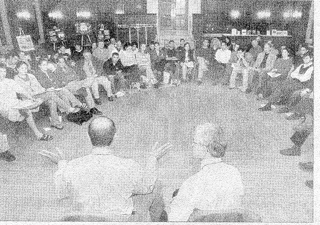Sunday, November 3, 2002
WASHINGTON (AP) _ The two Georgetown University freshmen -- one pro-Israeli, the other pro-Palestinian -- exchanged angry words the first time they met. But the next time, at an evening-long student forum, Ilya Breyman and Maher Bitar ended the night by embracing and making vows to keep talking.
Said Bitar, whose family roots trace back to Palestine: "I would say this is a start."
Activists concerned about the Middle East conflict say similar moments have been occurring at campuses across the nation.
Despite clashes at San Francisco State University and the University of California at Berkeley -- and a letter signed by 300 academics decrying harassment of Jewish students -- activists say, more often, pro-Israeli and pro-Palestinian students are reaching out to each other.
"The people who are very vocal and visible get the attention. And those are the extremists," said Marisa Handler, a national organizer for the Tikkun Campus Network.
"The people in the middle are not as dramatic and they get less attention," said Handler, whose position has taken her to campuses around the country this year. Her group is an offshoot of Tikkun, the liberal Jewish magazine.
To be sure, unrest in the Middle East -- along with other political and social issues -- take a back seat for many college students to the rhythms of campus life: classes, exams and weekend parties or extracurricular activities.
When the subject of Palestine and Israel is raised, however, it is often in the spirit brought to the Georgetown discussion by Muhammed Alatar, a Palestinian-American who co-facilitated the forum there. The Jewish-Palestinian Living Room Dialogue Group also helped coordinate the meeting.
"I love my people, I love Palestine and I love our cause," Alatar told the recent gathering of 80 students and faculty. "But I also love humanity."
The norm is for students to reject zealotry on either side of the debate, said Shana Kirsch, a New York University student and a co-founder of Conversation Peace, another group advocating communication over confrontation.
"Even though the situation is more desperate in the Middle East, people seem more willing to dialogue," she said.
Hodan Hassan of the Council on American-Islamic Relations said any form of discussion is a positive step. "It sensitizes both sides to real fears and it gives the people the opportunity to put a face on the, quote-unquote, other side," he said.
Still, some see potential problems brewing.
While "campuses are not on fire, there are a lot of embers sitting there if we pay attention," said Richard Joel, president of Hillel, an organization representing thousands of Jewish students worldwide.
Recent campaigns promoting divestiture from Israel, he said, rank high on the list of potentially troublesome issues. Last spring, a petition signed by 590 faculty, students and alumni asked Harvard and the Massachusetts Institute of Technology to divest Israeli investments from their endowments.
The divestiture issue as well as the San Francisco State and Berkeley incidents prompted former Dartmouth University President James O. Freedman this summer to persuade other prominent academics to sign a statement calling for "intimidation-free" campuses. The statement was published as a full-page advertisement in The New York Times.
Freedman acknowledged the right of faculty members to speak out in favor of divestiture, but said professors need to be "particularly sensitive to letting Jewish kids respond without being intimidated."
A patron of a Jewish-Muslim dining hall that opened last year at Dartmouth, sophomore David Karem said divestiture is rarely on the table when the two groups gather to find common ground. Karem agrees with Joel, however, that Israeli-Palestinian discourse on many campuses too often focuses on process rather than conflict resolution.
Some activists may view Palestinian-Israeli dialogues in the historical context of the impact American college students had on civil rights, South African apartheid and U.S. involvement in Southeast Asia. But Karem is not sure his meals with Muslims will help break the cycle of violence in the Mideast.
